P.S. I Love You Read online
Page 5
Your servant,
Mr. Duke
Cora smiled at the nickname that not only concealed his identity to anyone who might see the letter but affirmed his friendship with her. She quickly dressed and went in search of paper and a pen for a written response. A maid directed Cora to a secretarial desk in the library. The wooden desktop was cleared. “Is there paper I could use?” Before the maid left the room, she added, “And a pen?”
“Yes, miss.” The woman touched the top of the cabinet, lowering a dropdown table onto an arm that swung out from below. Inside were trays of paper and bottles of ink. Beside the ink were pens, sort of. The tools resembled the ones used by calligraphers.
Oh, no. “Thank you.” Cora hoped her tone conveyed more confidence than she felt, but she sat down and slowly began selecting paper to place on the desk. The door whispered closed, and she let out a breath. Is nothing easy in this century?
Over several minutes, she struggled with the ink and pen through several attempts only to have unreadable words on ink-splotched paper. She hit on the problem and swirled the tip of the pen around on the ruined papers to remove the excess ink, wiped it with the paper, which she threw on the fire grate, then sat again. This time dipping only the end in the ink, she was able to write two legible words at a time. With much effort, she had a passable letter.
Chapter 5
Simon
Simon retired to his room before opening the letter. He chuckled deep in his chest at the salutation as he dropped into a thickly padded green-striped chair.
Dear Mr. Albans Duke Grace Tuttle,
Thank you for the invitation. I accept. Your servitude is greatly appreciated. I expect to have this business tied up within the month, so you won’t have to worry about a long commitment to me.
Cheers,
Cora
P.S. How did I do on your name? I thought if I threw a few titles up there, I might hit on the right combination. About that tutoring position—it would be great to know who is a “Sir” or “My Lord” or “Your Grace” or a “Mister.” It seems to matter a great deal here, as I was informed by the many guests who visited Aunt Nellie’s parlor this morning with hope of hearing news of you.
I would like to understand this business of titles and wondered if you would provide me with a little insight. Maybe that isn’t something you’ve thought about since it’s always been part of your life.
What was it like to be a little dukelet? Did you get to wear long pants? Did you play outside with friends, or did you stay inside and learn to be proper and stern? What do you do when you aren’t duke-ing about? Do you have hobbies? Or a favorite color? Do you travel? Have you been to London to visit the queen? What did you there?
Simon found himself laughing at the “dukelet” and “duke-ing about” comments. He was amused at how irreverent Cora was about the prestige of the peerage. It fit her and her relaxed manner. It was warm and enchanting.
Simon felt a spike of interest at the prospect of seeing Cora join the party. It surprised him that she admitted to not wanting a long commitment from him. That was certainly contrary to every other female of his acquaintance. But she was contrary to every other woman—even in the way she moved. His mind ran through memories of watching her dance and fight. She was intriguing.
He planned his route, so she would be the last to enter the carriage. If he first picked up Lady and Miss Radnor followed by Everett, the ladies would sit opposite him, and Everett would be beside him. When Miss May joined them, she would also sit on the bench with the ladies. That’s all who would fit. When Cora arrived, she would have to take the only remaining seat, between him and Everett.
A smile grew across his lips at the thought of the rustle of her skirts as the carriage swayed. He fondly anticipated that when the carriage made a strong left turn, Cora might be just off balance enough to sway against his shoulder and arm. The pleasant ride would lead to a pleasant evening as well.
He imagined her walking on his arm, sitting across the table or near him, and stealing glances at each other through the evening. He wondered what the sparkling pageant lights shooting from the boats would look like reflected in Cora’s eyes. Would he have a moment with her to himself?
When he considered his role of matchmaker, the excitement appreciably darkened, something he didn’t chose to examine very closely after Everett’s unlikely prediction. He knew all too well the expectations held for his marriage and bride, someone with an impeccable family history and social standing nearly equal to his own.
Which standing was that? Of being a younger son who was elevated as a result of extreme grief? He was a younger son still in his heart, one who would do his duty to family but considered how to remain true to himself along the way.
Although more prospective brides attended London events, they were often treated with suspect by titled gentlemen who knew they were looking to purchase a title.
But wasn’t that exactly what the heiresses from America were doing? In exchange for their large dowries, they became a lady or baroness or duchess. What was Cora’s story? Why was she looking for a title when they appeared to be of little value to her and of less esteem? She seemed a paradox—an enchanting, beautiful paradox.
Picking up the paper again, Simon walked to the window and reread the letter. He looked at the careful writing with thick lines where the pen had moved slowly. He studied the unique shape of some letters and the unusual spellings. He read it again and again until he imagined he could hear her voice and laughter as she teased him from the page.
Cora had said she thought he was different. Shame burned deep in his gut. Did she know his secret? If so, she was out of his reach. If society should find out as well, he would be saddled with a wife of convenience and in name only. Maybe he shouldn’t want Cora to be with a man like him. She would find his fault eventually. Would she think him less? And even if she didn’t already know, she’d asked him to help her with introductions, clearly not considering him a prize.
For a fleeting second, he wanted to twist the paper into a wad and toss it in the fireplace. But he couldn’t. It would be his consolation prize should she leave.
The almost-full carriage made its way slowly over the roads, stopping in front of Twickenham Manor. Simon’s pulse raced with anticipation as the footman lowered the stairs. He stepped down to assist Cora.
“You’re very lovely tonight, Cora.” Although her hair had been pinned on top of her head, several tendrils hung about her shoulders. Simon wondered if the curls were natural. It seemed an inconsequential thing, making him even more curious.
“Thank you. I’m looking forward to this. I’ve never been to a pageant on a river before.”
Before she lifted her foot to the second step, the carriage jostled back and forth, then settled again. Cora disappeared inside, her skirts trailing her. When it was apparent they were arranged, Simon stepped inside as well.
Lady Radnor had obviously jumped into the seat where Simon had expected Cora, and Cora sat in the middle of the seat opposite him between May and Lucy.
Disappointed, Simon took his seat but not before he noticed Everett’s stiff expression, which clearly said that he didn’t like the idea of rubbing thighs with his possible future mother-in-law.
To Simon’s surprise, he very much liked having Cora sit opposite him in the coach where he could watch her expressions. The conversation had turned toward the monarchy, and Cora seemed alive with the exchange.
“Well, it’s been a hundred years or so, hasn’t it, since there was a queen on the throne? It’s exciting—it doesn’t happen often that a woman leads a powerful nation. We haven’t managed it in America.”
The other women seemed interested in their gloves or the seams of their dresses, not joining in at all. Now and again, Lucy glanced up as if she would interject something, but each time her eyes slid toward her mother, and she cast them down again. May seemed to listen with interest, an amused expression on her face.
Simon noticed that Lady Radnor’s
lips looked unusually thin and pressed together. He wondered how long she would endure Cora’s fascination with talking about politics.
“Female rulers are a bit more likely under our system than yours,” Everett commented.
“Yes, I suppose when you leave God in charge of political succession, he slips in women more often than voters would—who are also all men.”
Lady Radnor’s jaw dropped open with her mouth forming an O. She didn’t say anything. Simon wondered what could be said—the reasoning was sound. America must educate women better on world matters.
“The queen’s quite progressive,” Cora continued.
“What evidence will you present for that claim?” Simon asked. He had a hunch that she would relish expressing her views and not shy away from the opportunity.
“For one, she knew her own mind, resisting familial and political pressures early on as queen. More evidence can be seen when she supported the removal of slavery from all the territories of Britain. That can’t have been popular, but I applaud her.”
Simon knew Cora had more to say when she took a breath, but Lady Radnor threw herself into the conversation. “She wore a lovely white gown at her wedding.”
Cora seemed stunned, maybe trying to fathom some connection between the dress and slavery.
“Oh, yes. I’ll be married in white, too,” Lucy said.
For one quick moment, Simon saw a dainty ridge form between Cora’s eyes. Would she take back the conversation or join the inane frivolity? What was next—the weather?
Sitting on Cora’s left, Lucy nodded enthusiastically. “And I’ll wear flowers in my hair just as she did.” Her eyes flicked to Everett’s and dashed away just as quickly, reminding Simon that he had an obligation to free Everett from his duty as Simon’s nursemaid.
Cora looked at Simon. When her mouth dropped open and snapped back shut, he wondered at the resolve it might take for her to acquiesce the topic of discussion. He wondered at this confident, intelligent woman who could discuss skipping rocks and political analyses with equal comfort. He determined to find a time and a place where he would reopen the dam of thoughts behind her now-pressed lips.
Simon watched as Cora rearranged the fit of her gloves and smoothed her dress. He saw a small smile cross her lips with no real enjoyment or life behind it, her eyes and cheeks completely unaffected. So, she didn’t care to talk of fashion—a very positive trait.
The coach trembled to a stop. Simon assisted Lady Radnor out followed by Miss May Cottrell. The ladies made their way to the home’s entrance. Cora was the third woman to exit, and although Simon’s hand was raised to help her, she stood crouched in the doorway, looking around with interest for quite some time. Between the hinge and the door, Simon saw Everett’s face very near Lucy’s.
Ah, that’s twice she’s played at Cupid for the couple.
Cora finally alighted, and Simon reluctantly released her to assist Lucy.
The double doors to the grand dining room swung open, and his party was introduced. “His Grace the Duke of Hertfordshire, Earl of St. Albans.” All eyes turned their way, and the introduction continued. “Lady May Cottrell, Lady Radnor, Miss Lucy Radnor, Mr. Everett Hawley, and Miss Cora Rey of the Americas.”
A few guests gathered as Simon’s group mingled with the rest. The women drifted off with Lady Radnor introducing the young women here and there.
At the slap on his left shoulder, Simon clamped down on a startle then turned to see a friend from Eaton. “Wetheridge.” He couldn’t say that he was glad to see him. He wasn’t.
“Though you’ve been a duke for nearly three years, you’ve successfully avoided the parson’s mousetrap, have you?”
Everett shook hands with the man and answered for Simon. “Deucedly hard to get married since he’s been hiding out in the wilds of Scotland all that time. What about you?”
Before Wetheridge could answer, Simon said, “One doesn’t have to hide out in Lifton, but the effect is the same by just being there. What brings you up from the south—sheep or cattle?”
A jab at Wetheridge’s county’s industry usually brought a stunning retort, but this time, there was no answer. Simon noticed an appreciative look in his eye directed over Simon’s shoulder at Cora, who along with May and Lucy was set to join the men.
Simon debated how to withhold an introduction.
Just then, he heard Everett say, “Lord Wetheridge, may I introduce Lady May Cottrell, Miss Lucy Radnor, and Miss Cora Rey.”
The first two women dipped a curtsy, and Cora tipped her head in acknowledgement. Then Simon addressed the ladies to complete the introduction. “May I present Lord Wetheridge. His family seat is a barony in Devon.”
When Lord Wetheridge stood from bowing to the women, he extended his arm to Cora and asked, “May I engage you for watching the pageant with me?”
“Sorry, chap. You’re too late for that.” Simon stepped up and presented her his arm as well and was pleased when she laid her hand on it. A small victory, but a satisfying one.
Wetheridge’s eyes barely glanced toward Simon and quickly returned to Cora. “No worry. Since I am merely a baron, I should like to escort you to dinner.”
Simon’s mouth opened but snapped shut. He wanted to deflect that offer as well, but knew Wetheridge was likely correct. Simon would go through the doorway long before Cora was seated.
“I would like that very much.” Cora smiled. “You’ll have to tell me all about Devon. I have never visited there.”
The way she leaned a bit toward Wetheridge in answering him looked to Simon as if she really meant it.
“How are you three men acquainted?” Cora asked.
“Cousins,” Wetheridge and Everett answered at the same time Simon replied, “School.”
She nodded.
Although a short time passed, the room filled with people and noise, thick with conversations, but much of that was lost to Simon. Before the panic he felt in his chest rose, he maneuvered the group to the side of the room, his back toward a wall with only the corner to his left, effectively controlling the size of group surrounding him.
How would he manage dinner? He had strategically avoided this type of social gathering. He would have sent regrets, but it was the only invitation this evening, and it appeared to his dismay that he would accept even this challenge to be in Cora’s company again.
Just as Wetheridge predicted, Simon escorted a lovely, though elderly, woman to dinner. His seating assignment placed him between two gray-haired women dripping in diamonds. As the courses were served, the conversation partners paired, and he turned, thankfully, to the right.
“We’ve had unseasonably mild weather. Have we not?” Simon asked.
“I can’t hear you. I’m sure you were saying something proper. What was it about—the weather or the furnishings?’ Her voice cracked with some effort to be heard.
“The weather.” Simon found himself leaning much closer.
“Yes. The leather is quite becoming on the seats. It’s new since the last time I was here.”
As the conversation, of sorts, continued, Simon found his chest tightening. He had passible hearing in one ear, but the other was little help. He felt as if he were staring into his gloomy future.
Just before the conversation partners turned, Simon’s first partner said, “You’ll have little luck with Anabelle. She’s earless as a beetle.”
Even as a child, he knew the descriptions of those without hearing were flung about without kindness: stone deaf, out of hearing, deaf as an adder.
The other woman smiled at Simon, but her eyes slid away quickly to attend to her soup course. He spent a rather silent dinner, volleying between the two women, leaving him plenty of time to watch Cora.
Though he could only see her profile when she spoke with Wetheridge, he noticed the many times they laughed, and he found himself cursing the social demands of his own titles yet again. He imagined the ringing sound of her voice and her eyes glowing with mirth at the bounder w
ho was enjoying her company instead of him.
Cora sat near the middle of a long table, as far away from his as could be, at the fourth and final table to be seated. Simon noticed those seating assignments all seemed to be debutantes and eligible young men, many of whom hadn’t come into their inheritances yet and only claimed honorary titles with surnames as he had expected to for the rest of his life. He also noticed the lax nature of dinner etiquette around her with conversations obviously being directed across the table. From his count, Cora would meet at least four of the men around her without any effort.
At the end of the meal, the groups set out to gather in the ballroom, seeking their parties before being led toward the back lawn abutting the Thames. Lady Radnor could not be found until the masses had already departed, and not until then could their group move forward.
Lucy took her mother by the arm, and Everett quickened to follow. “I’m ready to burst with excitement.” May clasped her hands and quickened her pace, excitement apparently driving her to catch up with the crowd who went before them. As their group outpaced them, Cora and Simon slowed their progress a bit.
“You’re not terribly good at the matchmaker business, but don’t worry. After you’ve practiced on me, you’ll be ready for whatever your younger sisters throw at you,” Cora remarked in the teasing tone Simon was beginning to recognize.
“You doubt me? I’ve introduced you to many eligible men.” Simon cringed at who was on that list.
At that, Cora raised her eyebrows, seeming to challenge his statement. She stopped walking, and Simon had to turn back a step to stay beside her.
“At least several,” he amended. “And ‘eligible’ is a relative term. Granted they are not married, but nor should they be.”
Cora began walking down the hallway again. “Oh, yes, you said Lord Bellion was a cad. You introduced the Hon. Michael Wyndham as a puppy. Mr. Echols, you called a rapscallion. Oh, and you refused to introduce me to the duke of Norshire, saying he was a rake.”
“His Grace, the Duke of Norshire.” Cora waved off the correction of how to say the formal title as Simon continued as if punctuating each word. “He eminently is. And you’re welcome.”

 One Last Summer
One Last Summer Secondhand Hearts (Peak City Romance Book 1)
Secondhand Hearts (Peak City Romance Book 1)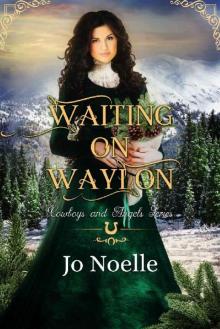 Waiting on Waylon
Waiting on Waylon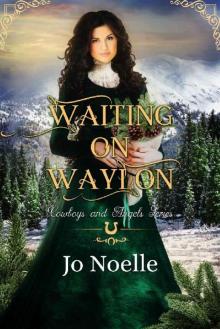 Waiting on Waylon (Cowboys & Angels Book 6)
Waiting on Waylon (Cowboys & Angels Book 6)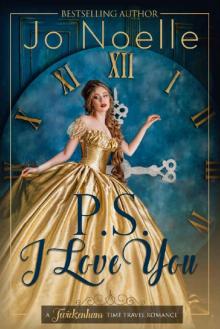 P.S. I Love You
P.S. I Love You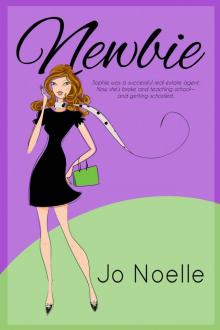 Newbie
Newbie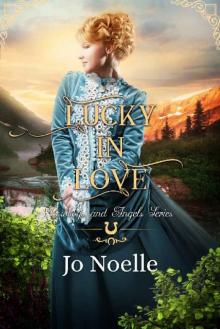 Lucky in Love (Cowboys & Angels Book 2)
Lucky in Love (Cowboys & Angels Book 2) Truly His Type (Cowboys and Angels Book 25)
Truly His Type (Cowboys and Angels Book 25) Kisses With KC
Kisses With KC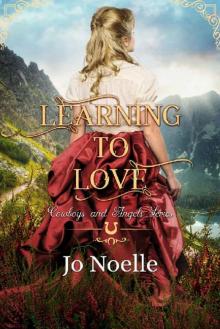 Learning to Love (Cowboys and Angels Book 21)
Learning to Love (Cowboys and Angels Book 21)